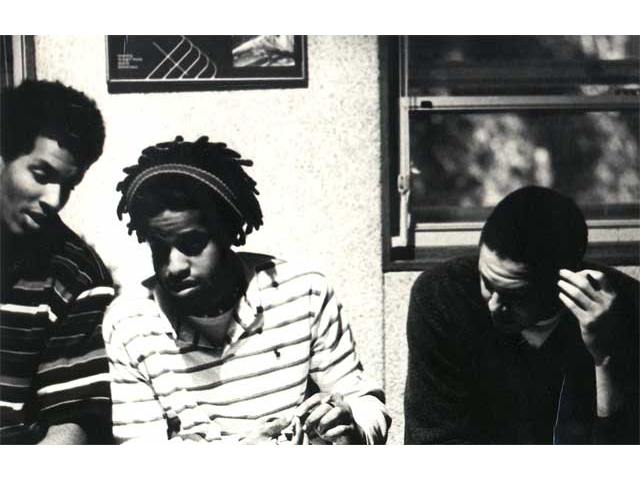When the Falling Stars first appeared in the fall of 1996, the occasion was an open mic night on a college campus and the lineup was different from the group that would eventually perform dozens of shows over the next two and a half years. In fact, the original lineup of four only appeared together that one occasion in a basement space with an improvised sound system and only the whimsy of actually performing hip-hop as its basis. The process that changed the lineup was one of machinations and dissemblance by two of the members; the name of the group had been originated outside of the confines of the membership as well. Plainly, the group’s destiny was to be as star-crossed as its unironic name implied.
The group’s second show, performed several months later by the lineup of three that would appear in all future shows, broke the attendance record at the small space where it was held — much to the consternation of a few better-rehearsed indie-rockers and professed playwrights that regularly used the space. The show was marked by technical difficulties, a more professional sound setup notwithstanding, nervousness of at least one of the participants, and the eager crowd that filled the space and spilled into the adjacent parking lot. In the fall of 1996 at least one college campus was ready to support a home-grown hip-hop group, even if it meant putting up with bad sound and soaring 19-year-old egos whose one wish, it seemed, was to see more hands in the air.
Soon enough, the group would be playing paid gigs and dank basements alike — all with enough enthusiasm to make frat-boys in the back raise their fists — or were they beers? — skyward and cute women to the side smile and shake the right parts of themselves from time to time.
By the time that the engine’s machine could say “vroom” on command, change was already visible on the horizon. The group had spent a summer in residence at a local bar with a different backup band from its hand-picked House of Representatives. The new back-up band, comprised of a flautist, two bassists and a drummer, would give the live show a jazzier feel. With school back in session, however, membership of the instrumentalists performing with the Falling Stars was in flux. The group, unfazed, settled in the studio to work on its only EP, Compositions. The most obnoxiously-titled song on the album, Breaks and Beats (Avant-Garde vs. Neoclassical), stretched to nearly seven minutes and began by sampling a keyboard’s how-to video: “I have turned off the pitch detection window.”
Among the many certainties proposed by such a song on such an album, pop stardom was decidedly not among them.
Many questions float in the mind of a typical college senior. One is, however, not likely to find the following: “Should we start selling weed so that we can afford to press a 12″ of ‘Stomp?'” The answer: a reluctant no. Of course, a typical college hip-hop group does not break up because one member is hired to play basketball professionally in Holland while another member receives a Fullbright to study hip-hop in Germany the next year. The group’s bedrooms in the third floor of a wobbly East Side home played host to many typical conversations too of course and the aspirations of three young men on apparently divergent paths. Nor does a onetime producer grieve in recounting the lyric, “my one dream is my one hurt under my one shirt.”
Those words remain true as ever.
On the occasion of the second member of the Falling Stars (second alignment) to be married, one is reminded that the road that turns young men into adults is seldom walked alone, and that the life bonds that men choose for themselves are borne out of different kind of love than the one that causes them to bob heads for hours on end freestyling, or rehearsing, or rewinding cassette tapes to the start of the newest beat.
Or are they?
J-Bro and Tiger Lily celebrated marriage, in part, by laying down some lyrics. There was a coolness to the August night. Family members danced. At least one erstwhile member of the Falling Stars looked onto the stage with a curious delight upon hearing the words to “Thin Line,” the group’s only song about love, having morphed over the years to accommodate a new two-person lineup. Though performed live, “Thin Line” never made it onto the EP. Whatever the song’s title had become, it was clear that it had been nurtured along by two kinds of love.
Better for the night that stars hide above the city’s canopy of artificial light — man does not deserve to see all at once. Over time, and sometimes in music, things take shape. The eyes adjust; the ear understands; the pen, the camera take account. For that, full smiles echo on the cheeks during long night drives from the past to the present tense and home.
—
Will the true adults please stand up?
hear here:
Stomp
Breaks And Beats (Avant-Garde vs. Neoclassical)
No Matter (the live version of “Stomp”)




white tie says it all.
[…] During the years when I counted hip-hop producer among my career aspirations — you know, back when I thought it was cool to drop lyrics like, “breaking down crews to their inverse ratio” — I spent a lot of time in record stores. Crate digging, nahmsayin? Strictly vinyls. Maybe a little too much time. On one such occasion while poring over the endless stacks at Planet Records‘ now defunct Comm. Ave. location in Boston the familiar sound of crackle and hiss played over the house hi-fi. In a few seconds I found myself hypnotized by the vertiginous trills of a guitar sound so lush I dropped my records and speed-walked to the elevated desk at the front. “What IS this,” I demanded. […]